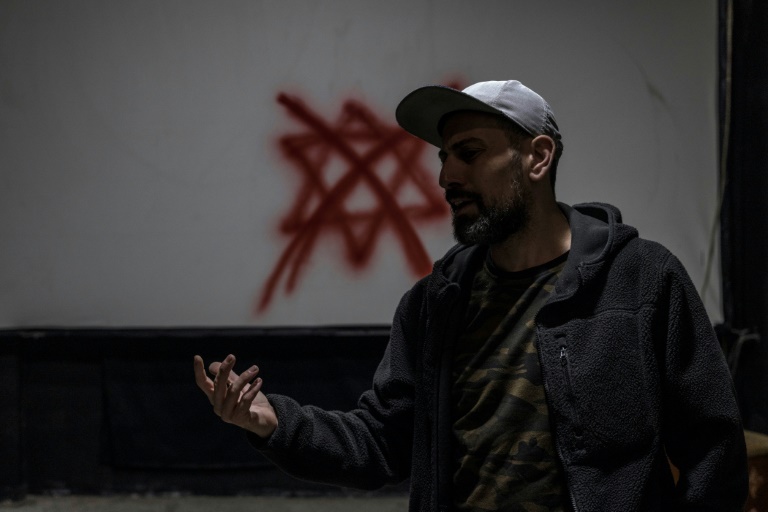West Bank theatre raided by Israel vows to resume ‘resistance’

Artistic director Ahmed Tobasi is back at work and determined to keep the doors of the vandalised Palestinian Freedom Theatre open
Jenin – The Palestinian Freedom Theatre in the occupied West Bank will welcome actors back this weekend, just over a fortnight after an Israeli raid on the centre sparked an international outcry.
Its artistic director Ahmed Tobasi told AFP the theatre in Jenin refugee camp had become a symbol of Palestinian resistance against Israel’s occupation of the West Bank.
He said troops broke into and vandalised the small cultural centre earlier this month during a wider raid on Jenin, leaving behind a trail of damage and Stars of David graffitied across the walls. The theatre said soldiers also arrested several employees in their homes.
Tobasi, who said he was among those detained, is now back at work and determined to keep the centre open.
“For me, this is resistance,” the 39-year-old said as he gave AFP a tour of the theatre, which was set up in 2006.
Soon after the raid on December 13 a Freedom Theatre appeal for the release of its staff won international support, with demonstrations in the streets of New York and Paris and playwrights, actors and directors from Britain to Mexico expressing their support.
Since its founding, the unassuming performance space has become symbolic for Palestinians and their supporters, with its actors touring the world staging plays.
Staff said they believed Israeli soldiers had gone out of their way to target the theatre.
The Israeli army described the wider raid on Jenin, which Palestinian health authorities say killed 11 people, as designed to combat “terrorists” in the camp.
“This is a theatre — there are no weapons or terrorists here,” Tobasi said.
While the raid targeted a number of buildings in the camp, Tobasi said that to reach the theatre troops would have needed to turn off the main road and walk around 20 metres (yards) towards its entrance.
Another staff member, Ranin Odeh, said the centre was singled out for its reputation as “a place of resistance through art”.
“I felt so angry to see Israeli soldiers inside. The theatre is like my home. They want to kill everything — not just people, but ideas too,” said the 31-year-old, who runs the theatre’s youth programme.
Staff spent several days clearing up and plan to stage their first big event, an end-of-year workshop for young actors, on Sunday.
The army has not responded to AFP’s request for comment.
– Door-to-door arrests –
At the scene, Tobasi led AFP journalists past broken locks, splintered doorframes and smashed black and white photos.
What kind of behaviour is this from soldiers?” he said, standing next to a red Star of David sprayed across a projector screen.
The theatre posted an image on social media which appears to show troops and a military vehicle just outside the building. AFP has not been able to verify the picture.
Soldiers went door to door arresting members of staff from their homes, the Freedom Theatre said in a series of online statements, adding they were among more than 100 Palestinians detained in Jenin.
Drama graduate Jamal Abu Joas was released after more than a week in detention, while producer and manager Mustafa Sheta remains in custody, said Tobasi, who was still shaken from his own ordeal.
Tobasi said he was blindfolded, had his hands cuffed behind his back and was held for more than 12 hours at the Salam checkpoint west of Jenin. He accused army reservists of beating him.
Violence in the West Bank — captured by Israel during the 1967 Six-Day War and occupied ever since — has surged following October 7.
Israeli forces and settlers have killed at least 314 people in the territory, Palestinian health officials say.
Jenin’s refugee camp, a stronghold for Palestinian armed groups, is regularly targeted by Israel in deadly raids. The Palestinian health ministry says many of those killed have been civilians.
Tobasi, who was born in and grew up in the camp, said the theatre had given him a way to resist occupation without violence. It was a break from the reality of life in the camp and a chance to imagine an alternative.
Following the raid, he was more convinced than ever of the centre’s power.
“Theatre is the place where we can express, fight and resist all,” Tobasi said.
